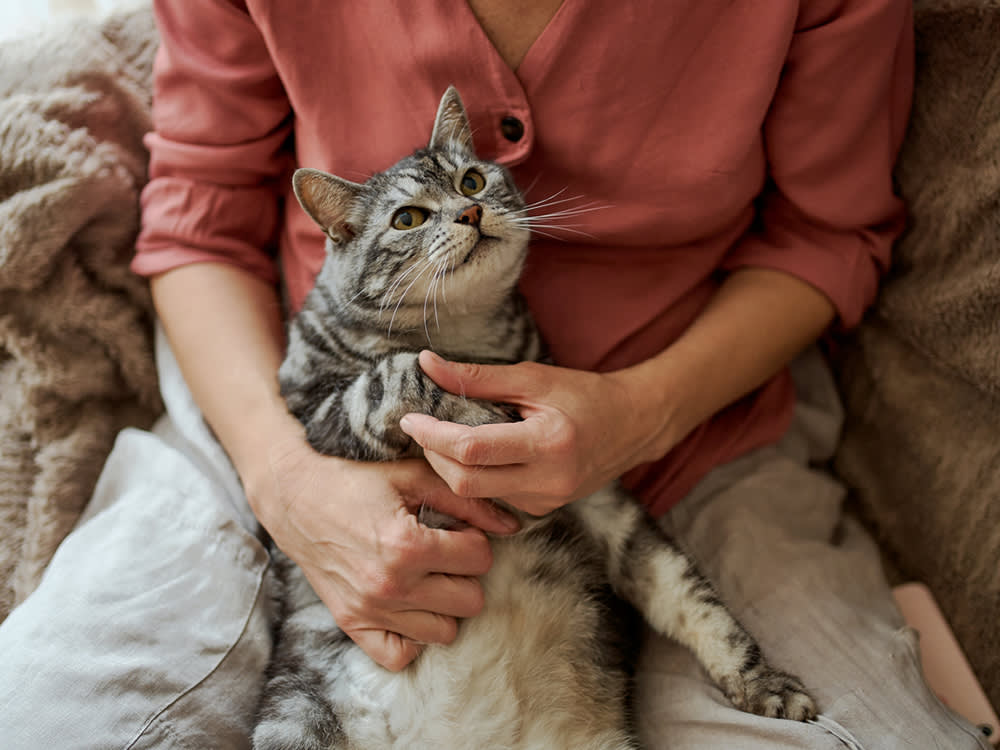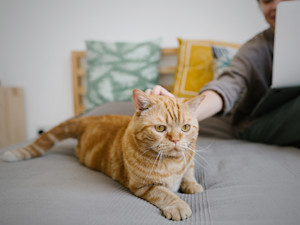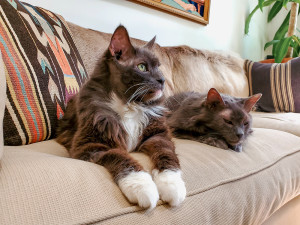How to Care for Your Senior Cat
From taking them to the vet more often to giving them a hand with grooming, older kitties need a little extra TLC.

share article
You and your kitty experienced all the joys of kittenhood. You settled into a routine and have been the best of friends for years. Maintaining their health hasn’t entailed much more than preventative careopens in a new tab and dental cleaningsopens in a new tab. But now your cat is getting older and you’re noticing small changes. They play less, sleep more, and seem picky with foodopens in a new tab. Are all these changes normal signs of aging? Here, some considerations to make sure your golden child is thriving as they enter their golden years.
1. Your Senior Cat Needs More Frequent Vet Visits
Cats are considered to be in their senior years when they are 8-10 years old. Senior cats require more frequent veterinary visits, ideally at least every six months. Checking blood work, urine, and blood pressure at each visit may be the key to early detection of common diseases diagnosed in senior catsopens in a new tab like kidney diseaseopens in a new tab, hyperthyroidopens in a new tab disease, hypertension, or diabetesopens in a new tab mellitus. Cats who have chronic health issues require even more frequent vet visits. Changes in your cat’s behavior, energy level, or food intake should not automatically be chalked up to “old age.” Any concerns should be relayed to your veterinarian to determine if testing is recommended. Symptoms that warrant a visit to the vet include:
Anorexia
Weakness or lethargy
Vomitingopens in a new tab or diarrhea
Sudden vision loss
2. Your Senior Cat May Develop Mobility Issues
Your cat is likely to have a harder time getting around as they get older. Cats will often develop arthritis as they age, which can impact their ability to jump and climbopens in a new tab in the way they are accustomed to. Minor changes to your cat’s living space can make a big impact on her comfort and quality of life. Your cat may appreciate if you make some of the following adjustments:
Provide pet stairs or ramps to ease access to furniture and her favorite windowsillopens in a new tab.
Ensure that food, water, beds, and litter boxesopens in a new tab are in areas that are easy to access with minimal obstacles.
Provide low-sided litter boxes to ease strain on hips and other joints.
Make sure your cat maintains a healthy body weightopens in a new tab since obesityopens in a new tab is extra taxing on arthritic joints.
Discuss medications or supplementsopens in a new tab with your veterinarian if you’re concerned that your cat is experiencing joint pain.
3. Your Senior Cat May Need a Little Extra Help with Grooming
Cats may groom themselves less frequently as they age. Underlying arthritis may make grooming an unpleasant task that is not worth the effort, and they may be unable to strike the impressive yoga poses needed to clean their nether regions. Without proper groomingopens in a new tab, the fur can become oily and matted. Gentle brushingopens in a new tab will help your cat maintain a healthy coat. If they enjoy being brushed, it can also serve as a bonding experience that they look forward to. Your senior cat may also require more regular nail trimsopens in a new tab. Claws become thicker and more brittle with age. Decreased activity leaves increased opportunity for claws to become overgrown.
4. Your Senior Cat May Experience Vision or Hearing Loss
Gradual vision or hearing loss may contribute to stress and confusion in senior cats. If you suspect your cat’s vision is declining, provide night lights in areas that will help them navigate their way to food or litter boxes in the dark. Avoid relocating furniture or commonly used resources to reduce disorientation. Remember that cats with vision or hearing loss may be easily startled if they are approached suddenly, so try to make your presence known.
5. Your Senior Cat Wants to Chill Out without Stress
Senior cats are comfortable with predictability. A stable environment, regular feeding schedule, and familiar company will help your cat feel safe and secure. Prolonged absences of their primary caretakers can be stressful, while the addition of new pets may feel like an intrusion on their peace and quiet. Provide your senior cat with a peaceful, warm, and cozy environment so they can live the luxurious stress-free life they deserve well into their golden years.

Dr. Alycia Washington, DVM, MS
Alycia Washington, DVM, is a small animal emergency veterinarian based in North Carolina. She works as a relief veterinarianopens in a new tab and provides services to numerous emergency and specialty hospitals. Dr. Washington is also a children’s book author and freelance writer with a focus on veterinary medicine. She has a special fondness for turtles, honey bees, and penguins — none of which she treats. In her free time, Dr. Washington enjoys travel, good food, and good enough coffee.

